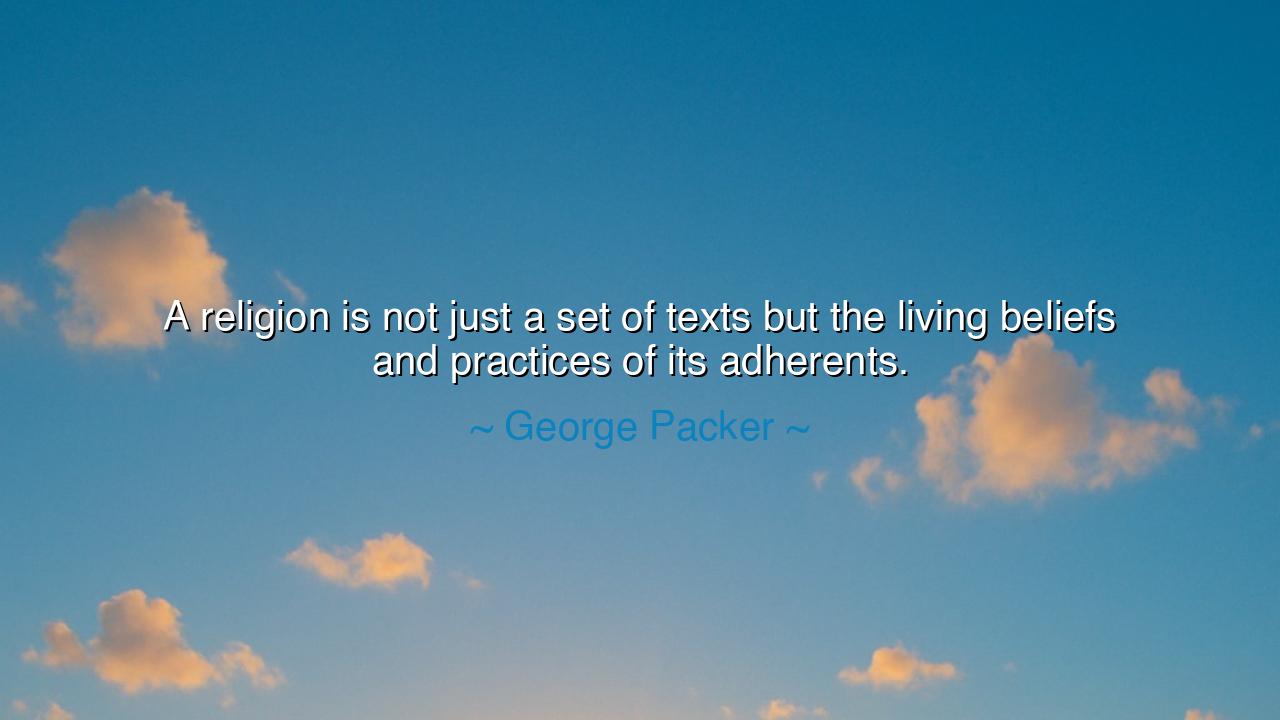
A religion is not just a set of texts but the living beliefs and
A religion is not just a set of texts but the living beliefs and practices of its adherents.






George Packer's words, "A religion is not just a set of texts but the living beliefs and practices of its adherents," speak to a profound understanding of the nature of faith and spirituality. In this insight, he urges us to look beyond the written word, beyond the sacred texts that have been passed down through the ages, and to recognize that the true essence of religion is found not in ink and parchment, but in the lived experience of those who follow it. A religion is not merely a collection of doctrines to be studied from afar, but a living tradition, continually breathed into life by the hearts, actions, and rituals of those who dedicate themselves to its principles.
From the dawn of human history, the great religions of the world have been built not just on sacred scriptures but on the practices and rituals that have shaped the lives of their followers. The Hindu tradition, for example, is filled not only with the Vedas, but also with the rituals of prayer, sacrifice, and meditation that have been passed down through generations. It is in these practices—whether the offering of food to the gods, the daily chants, or the pilgrimage to sacred sites—that the religion comes to life. The texts themselves serve as a guide, but it is the living embodiment of the beliefs in the actions of the people that gives the religion its true meaning.
Consider the life of Muhammad, the prophet of Islam. His teachings were not merely written down in the Quran, but were lived through his actions, his daily rituals, and his interactions with others. Muslims do not only read the Quran; they pray, they fast, they make the pilgrimage to Mecca, and they strive to embody the teachings of Muhammad in every aspect of their lives. In this way, the religion becomes not just a set of words, but a dynamic force that shapes their actions, their relationships, and their worldview. The living faith is as much about how one lives and practices as it is about what one believes.
The same can be said of the Christian faith, which, though founded on the teachings of Jesus and the Bible, is sustained by the lived experiences of Christians through the ages. The act of love, the call to forgive, the practice of charity, and the weekly gathering for communion—all of these are expressions of the living religion. It is not enough to simply read about the teachings of Jesus; one must also live them out in the world, in acts of kindness, compassion, and service to others. The living nature of Christianity is found in these practices, not in the mere study of its scriptures.
The ancient philosophers, such as Socrates, understood this as well. Socrates did not simply write or teach philosophy in the abstract; he lived it, questioning others, engaging in dialogue, and living out the principles of virtue and wisdom. The Greek philosophers understood that ideas are not just intellectual exercises—they are practices to be lived. In the same way, religion is not simply a matter of reading sacred texts or adhering to rigid doctrines, but about living out those beliefs in everyday life.
The lesson of Packer’s insight is this: religion is not something that exists in isolation from the world, nor is it merely a subject of study. It is active, alive, and in motion. It lives in the actions of its adherents, in the ways they practice their faith and the rituals they perform. To truly understand a religion, we must look not only at its texts, but at its living embodiment—the ways its followers walk, speak, and engage with the world.
Thus, we must not merely be passive observers of religion; we must also be participants in it. We must ask ourselves how our beliefs shape our actions, how the principles we espouse are reflected in the choices we make each day. Faith is not a thing to be contained within the pages of books, but a living force that demands expression through our deeds, through the way we treat others, and through the rituals we embrace. The true measure of a religion is not in the number of texts it has produced, but in the life it inspires. Let us strive to live our beliefs, to practice our faith, and to make the divine a living reality in our everyday lives.






AAdministratorAdministrator
Welcome, honored guests. Please leave a comment, we will respond soon